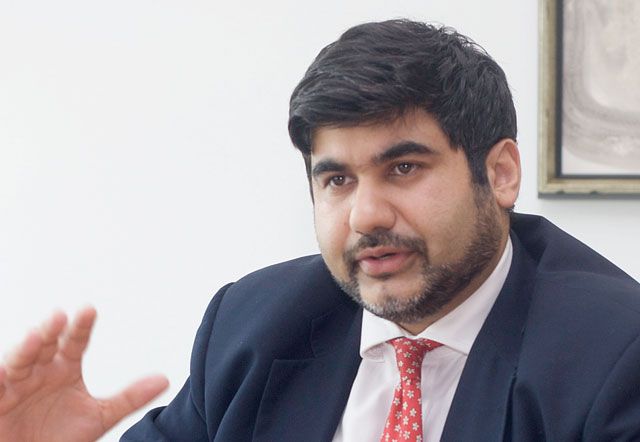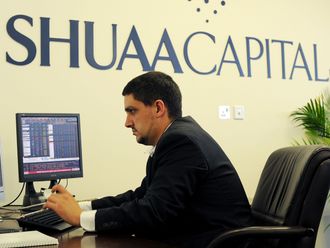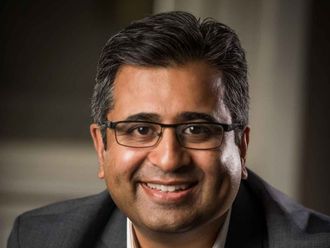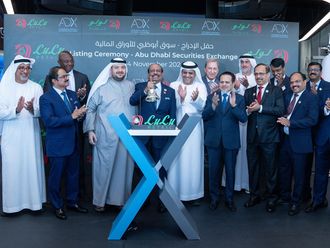In the last few months, especially between August and mid-October, local markets posted the strongest gains in the region. The Dubai Financial Market General Index peaked on October 14 when it reached 2,373.37.The DFM was the best performing GCC market this year ending October, with gains of 34.3 per cent.
Saudi Arabia's Tadawul hasn't done too badly either, with its gains of 30.5 per cent during the same period. Lately, the markets have been witnessing increasing volatility.
In an exclusive interview, Kamran Butt, director and head of Middle East and India, Private Banking Equity research, Credit Suisse, talks of how as the global economic recovery gains traction, regional markets will outperform. Excerpts:
Gulf News: Regional markets really picked up in the past few months. How do you account for that performance?
Kamran Butt: Let's put it into context. The region in general has been quite a substantial laggard in the global rally — especially in the first part of the year — particularly among the emerging markets. Why was that? In essence, sentiment was still pretty low here, [with] oil at $30 a barrel [having] a bearing on investors' feel-good factor.
Since the start of the year we have seen credit default swaps and sentiment really improve. We have seen oil pick up to close to $80 a barrel, [and] also seen initiatives by the government here that have been very strong and bold -- and that has really helped.
Undoubtedly we are in a challenging economic environment, and obviously no-one envisages a quick fix on that. But equity markets are lead indicators. Stock markets usually try to price in a recovery six to eight months before it actually happens in the real economy.
If you drill down to the UAE, it has really outperformed. It has a lot to do what is called a ‘recovery play', [with] investors looking at highly cyclical trades.
In a recovery process, we know that cyclical sectors and stocks outperform. If you look at the global economy, we are [coming] out of a recessionary period and moving into the recovery process.
Naturally, investors are looking at playing the high [so-called] ‘beta' stocks. It's ‘catch-up' trade now.
Is it sustainable? How do you view the overall equities trend in the region going forward?
Do I believe the sort of the run that we have seen will continue? Absolutely. If we look at some of the supportive measures behind it, such as valuations, they are still compelling. We still feel that year-to-date [these stocks] are still laggards. [Whereas] Far East and emerging markets are up 70-80 per cent, we are up on average about 30 to 40 per cent. As a market investor if I am looking at markets where I can generate ‘alpha', this region is still an attraction.
[There are] two cycles. The first is playing catch-up when you get the general market drifting higher. In the second, one has to differentiate on quality. Now everything is going up in general because they all had a heavy correction. At the moment it's a ‘top-down' [view].
Then you will be looking at a more ‘bottom-up' approach, when you look at earnings, at profitability, at balance sheets and, really, stock-picking — differentiating good companies and bad, [finding] those that have a prudent and robust business model and where we can see that in operational performance.
So which stocks and sectors are you bullish on in this environment?
The markets in the UAE are dominated by banks, real estate and telecom, and they have all benefited in the first phase.
In the second phase you cannot look at the industry on the same basis. You have to look at the individual player. I think you can pick winners even in the real estate sector today.
You can find banks which are performing better than others. So it's a relative trade. Having said that, banks will always be the focus. Whether it's the UAE or Saudi banks, those are the two leading areas, the so-called ‘regional big players'.
You touched upon valuations. How do they fare in the Gulf relative to emerging markets?
Multiples relative to emerging markets are undoubtedly attractively priced. Historically, this region has always traded at a premium to the emerging markets. Now valuations here are at a substantial discount.
Emerging markets [themselves] still aren't too expensive. Being at a discount is absolutely compelling for the region. Corporate earnings are still very supportive. [In fact, even] regional real estate, financial and telecom are at a substantial discount, on an historical basis and also on a global and emerging markets basis.
In the Gulf, some [markets] look ‘cheaper', and some look fair [value]. For us, Saudi Arabia looks fair, whereas Qatar and UAE are less expensive.
[Within] the Mena region, particularly Egypt, [valuations there] are also at a discount to the emerging markets whereas historically they have been at a premium. Corporate earnings in Egypt, and even economic growth, are still very high, and yet they are less expensive emerging markets.
There has been a marked improvement in terms of foreign investors taking an interest. Do you see their return as being in the manner of long-term investors, or just as speculators, leaving markets vulnerable to another ‘boom-bust' cycle?
I think we have seen a change in the industry. Undoubtedly, some of the investments we are seeing from overseas are that sort: speculative money, and you will always find that in any sort of emerging market. [But] we have seen a trend in terms of a little bit of long-term money entering.
For example. Credit Suisse has launched a Mena fund in August, which is long-term focused, to the region. That shows the commitment by foreign investors changing to a certain extent. What we have noticed is foreign investors providing an underlying uptrend in the market.
In fact, the trend is initiated by foreign investors. But to consistently play out on a medium- to long-term basis, we need the local money really to provide the momentum. To have a long-lasting performance, it will always be dictated by the local investors.
Given the nature of markets here, mostly still retail-dominated, when such investors do return, won't the markets still be subject to the vagaries of the retail mindset?
There is no quick fix. How the retail money trades, sort of ‘non-fundamental', I think that's still here to stay. I don't see any changes to that pattern or the volatility. We are in the early stages of a maturing cycle. We are nowhere near a phase where retail money has become [to some extent] very mature, or the portion of retail money been diluted by more local institution money — that hasn't happened.
One has to always appreciate that — it should not be seen as something of an obstacle. It should be seen as an opportunity. Naturally, we know that retail money always lags institutional money. So, in behavioural finance, [with] the sort of herd instinct which retail investing is all about, there is an opportunity in terms of the timing aspect.
If you understand what really drives retail investing, for instance, dividend income, and if you can second-guess what a dividend policy is going to be, or whether it's going to be compromised, you can know what kind of reaction there will be from the retail side.
Also in terms of corporate news flow: how that is disseminated to the retail community. [Knowing] how that is translated by the retail space, that provides opportunity.
What would you say are the lessons to be learned from the crisis for regional markets? What kind of changes do you expect?
Even before the crisis, we were in a development stage here, in companies' investor relations — in terms of reporting on time, being transparent on earnings, talking about mergers or potential mergers. These are all issues that were there pre-crisis, and remain post-crisis.
We have seen some of the capital market authorities being quite bold, saying (for instance) "if you don't give us disclosure in certain areas, you can't report on your earnings." I feel the intentions are great of policymakers and state-controlled organizations which look after the capital markets.
[The trends now are] still in line with this maturing cycle, and development of a classical frontier market; it's still an ongoing process. A lot of investors I touch base with would like to see more transparency on the earnings side, but also in the way the corporate news is disseminated.
Also, it's important to safeguard liquidity, maybe to look at some dedicated market-makers for certain markets, so investors can get in and out.
Does it make you positive about the future?
Absolutely. As we gain more traction in the global recovery, this region will be one of the outperformers. When liquidity improves, you will even find the UAE will outperform, as a classical frontier market. We are quite positive on [the outlook for] oil, and that has a bearing on the economic growth of the region, which is really aggressively going to pick up in 2010.
That clearly bodes well in terms of investors, and investability, within the region. For us, the Middle East will be one of the top choices. It will be in the top quartile [of performers] in the recovery phase. [Looking ahead], it's still small, a maturing environment that has great outperformance appeal.













